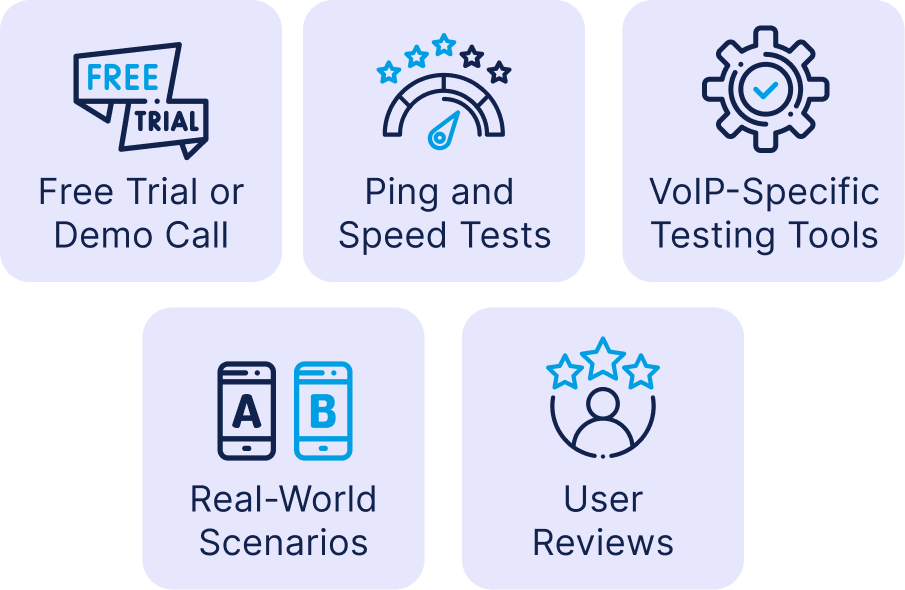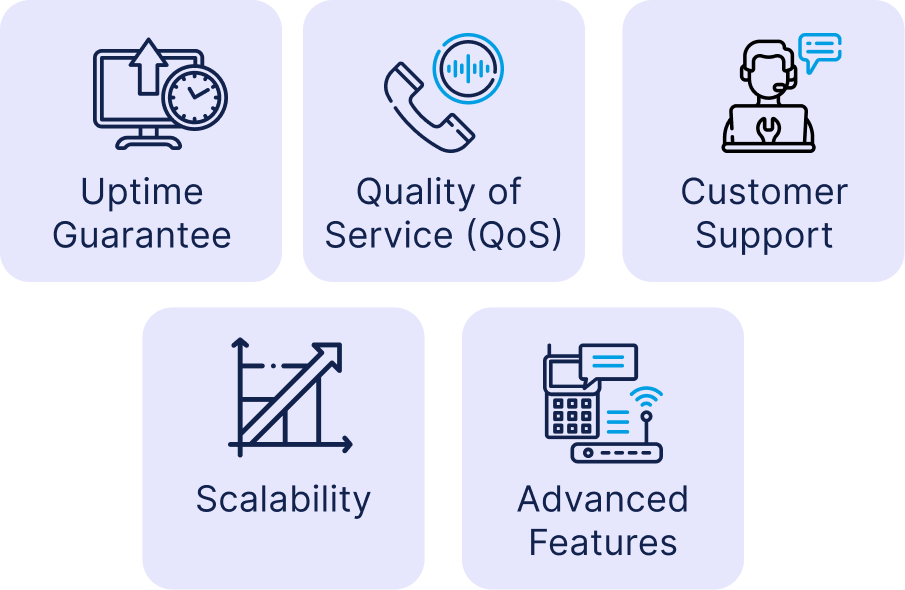VoIP Call Quality - Why It Matters and How to Test It
What is VoIP call quality?
VoIP (Voice over Internet Protocol) call quality refers to the clarity, reliability, and overall performance of voice calls made over the internet. High-quality VoIP ensures that conversations are clear, free from delays, and uninterrupted by distortions or dropped connections.
Why is VoIP call quality important?
- Professionalism: Poor call quality can damage your business’s reputation and frustrate customers or clients.
- Productivity: Clear communication ensures team collaboration without the need for repeats or clarifications.
- Customer Satisfaction: Your customers expect seamless interactions. Poor call quality can lead to dissatisfaction and loss of trust.
- Cost Efficiency: Investing in a reliable VoIP provider saves time and money by reducing the frequency of dropped calls or troubleshooting sessions.
Table of Contents
Main Menu
- What is VoIP call quality?
- Why is VoIP call quality important?
- What factors affect VoIP call quality?
- How can you test a provider’s VoIP call quality?
- What should you look for in a VoIP provider?
- What are the signs of poor VoIP call quality?
- How can you improve VoIP call quality?
- Why should you test VoIP quality before committing to a provider?
- How can you get started?
What factors affect VoIP call quality?
- Internet Connection: Bandwidth, latency, and packet loss play crucial roles in determining call quality.
- Network Configuration: Insufficient prioritization of VoIP traffic (QoS settings) can lead to poor call performance.
- Hardware and Devices: Outdated or low-quality headsets, routers, and phones may degrade call quality.
- VoIP Provider: Not all providers offer the same level of call quality. Look for providers with reliable servers and minimal jitter or lag.

How can you test a provider’s VoIP call quality?
- Free Trial or Demo Calls: Many VoIP providers offer free trials or demo calls. Use these opportunities to assess the call quality firsthand.
- Ping and Speed Tests: Test your internet connection speed and latency using tools like Speedtest.net to ensure it meets VoIP requirements.
- VoIP-Specific Testing Tools: Some providers offer VoIP readiness tools that evaluate jitter, packet loss, and latency.
- Real-World Scenarios: Conduct test calls during peak hours and from different devices or locations to assess reliability.
- User Reviews: Check online reviews and forums to learn about real customer experiences with a provider.

What should you look for in a VoIP provider?
- Uptime Guarantee: Look for providers offering at least 99.99% uptime.
- Quality of Service (QoS): Providers that prioritize VoIP traffic ensure better call clarity.
- Customer Support: Reliable support can quickly address issues if they arise.
- Scalability: Ensure the provider can handle your growing communication needs without compromising quality.
- Advanced Features: Look for HD voice, noise suppression, and call monitoring tools.

What are the signs of poor VoIP call quality?
- Choppy Audio: Indicates packet loss or insufficient bandwidth.
- Echoes: Usually caused by feedback from speakerphones or improper hardware setup.
- Delays (Latency): Noticeable time lag between speaking and hearing the response.
- Dropped Calls: Calls disconnect abruptly, indicating instability in the connection.
How can you improve VoIP call quality?
- Upgrade Your Internet: Ensure you have sufficient bandwidth and a reliable ISP.
- Optimize Network Settings: Configure your router to prioritize VoIP traffic using QoS settings.
- Use High-Quality Equipment: Invest in HD-capable devices and headsets.
- Work with a Trusted Provider: Choose a provider with a strong reputation for call quality.
- Regular Maintenance: Keep devices updated and check for firmware upgrades on routers or phones.

Why should you test VoIP quality before committing to a provider?
- VoIP services are not one-size-fits-all. Testing the quality helps you.
- Avoid hidden issues like lag or distortion that could impact daily operations.
- Confirm compatibility with your existing infrastructure.
- Ensure the provider meets your unique business needs and call volume requirements.
- Make a confident decision that supports your communication goals.
How can you get started?
- Run Internet Speed Tests: Confirm your network is ready for VoIP.
- Request a Free Trial: Most providers offer trial periods. Take advantage of this to evaluate call performance.
- Prepare Questions: Ask providers about their uptime, QoS guarantees, and technical support.
- Test Extensively: Make calls in different scenarios to uncover potential issues.
VoIP call quality is critical to smooth communication and the success of your business. By taking the time to test and compare providers, you can ensure you’re making the best choice for your needs.






